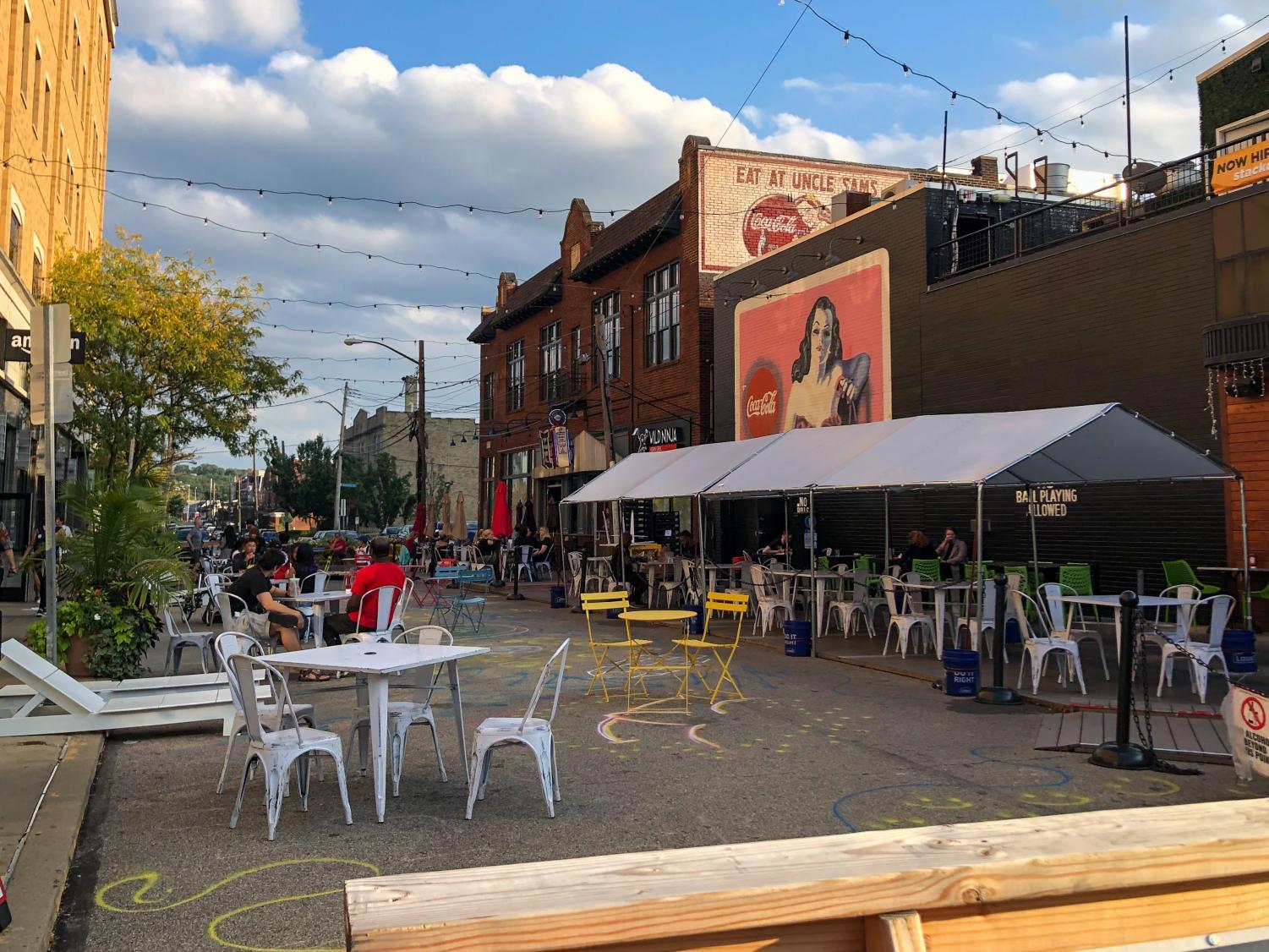Opinion | More Oakland streets should be reclaimed for pedestrians, businesses


The city neighborhoods of the future are walkable. And the city streets of the future, consequently, must prioritize pedestrians, bikers and public transportation. Catering to cars is not environmentally tenable nor economically wise.
Pittsburgh took some important steps toward making streets friendly to more than just motorists. The Neighborhood Slow Streets pilot program, the steady creation and expansion of bike lanes throughout the City and a slew of other traffic calming initiatives have all laid important groundwork for reducing the need for, and the nuisance created by cars.
The City’s temporary outdoor dining and retail program — a response to the COVID-19 pandemic and the resulting need to limit indoor interaction — really accelerated progress on the issue of walkability. The City has issued more than 103 permits to businesses for sidewalk and parking lane cafes, curbside pickup zones and full streets closures, as of July 9. Two birds, one stone — restaurants and stores could do business safely, while pedestrians were able to enjoy quieter and safer streets.
Oakland amassed an impressive collection of these permits, with the full closure of Oakland Avenue’s 200 block as the crown jewel. This has created a wonderful space for outdoor dining, installations such as a mini-golf course and more — “more” being that middle-aged guy I saw belting a karaoke rendition of Louis Armstrong’s “What A Wonderful World” next to Fuku Tea. My man.
This temporary permit program is set to expire on Dec. 31. Business owners seem to agree that these road closures should become permanent, and I’m sure Oakland residents are happy to see streets become more than just congested tributaries of Forbes and Fifth avenues. But this program should not only be maintained in Oakland — it should be expanded. It could become the cornerstone of the City’s plans to make Pittsburgh more walkable and safe for pedestrians, while also fulfilling the Oakland Business Improvement District’s mission of making the neighborhood a dynamic social space full of thriving restaurants and shops.
Oakland is a maze of side streets, many of them redundant. The City wouldn’t have to look hard to find new candidates for full street closures or sidewalk cafes.
For one, the 100 block of Oakland Avenue could easily be closed as well. At the moment, it’s home to a limited amount of outdoor seating — a start. But every time I grab a cup of overpriced coffee and take a seat in one of those tiny yellow chairs, I remember why I don’t do it more often. Only so much enjoyment can be had while breathing in car exhaust between sips, surrounded by a wall of plastic jersey barriers. Why not close the whole street?
The array of businesses on Oakland Avenue would certainly benefit from more outdoor seating, even if they weren’t so cramped inside. But the point of reclaiming streets for people rather than cars doesn’t have to be purely a calculation of capacity. Creating yet another space for diners, shoppers and people doing nothing in particular will only bring more buzz, and with it, money, to the heart of Oakland. The economic benefits of increasing a city’s walkability are well documented.
Another prime candidate for closure is the 400 block of Semple Street, a primarily commercial section home to a variety of bars and restaurants. This street also has some outdoor seating thanks to the City’s temporary program, but once again we should commit to a full closure. There are plenty of alternate ways for vehicles to navigate South Oakland.
As with any policy decision, there will be drawbacks. For example, more street closures and sidewalk cafes would certainly reduce the already scant parking around campus. More pedestrian-focused outdoor areas may also extend travel times by car or worsen traffic.
These are as much drawbacks, though, as they are much-needed incentives to reduce our reliance on cars. The long-term vision of cities must, for environmental and accessibility reasons, be less vehicle oriented. Plus, the vibrancy of Oakland and other neighborhoods doesn’t come from how well they accommodate cars, it comes from people.
The temporary outdoor dining and retail program — hopefully soon-to-be sans “temporary” — was a brilliant decision. Candidates for full or partial streets closures in Oakland are everywhere. Hopefully it’s equally easy for the City to find the will to double down on such an obviously beneficial program.
Jack Troy writes primarily about politics, SGB and being tired of capitalism. Write to him at jpt40@pitt.edu.
Recent Posts
First Place | The summer apartment
See two girls: one 19, the other 20. They’re both engineering students far from home,…
Second Place | Moist and buttery gluten-free coffee cake
This gluten-free coffee cake is so indulgent you would never even know it was free…
Third Place | Dinner rush
Runner, please. Hands. Behind. 86 zucchini. Heard. There’s a slight ringing in my ears, and…
Runner-Up | Let me tell you about hobbies and death
Well, everyone has to have a hobby. Mom says you gotta love something or else…
Runner-Up | Artemis
In her dream, the moon exploded. Something hit it from behind — some dark shadow,…
Runner-Up | Setting the scene
My father and I are running through the forest. Our footsteps pound with silent desperation…

